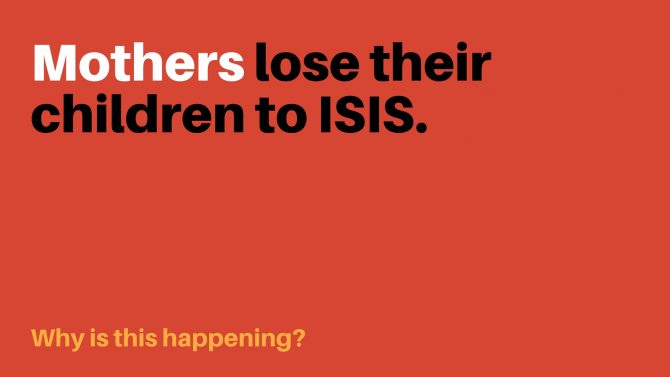I received a personal note from England to share this harrowing story of a mother whose son joined ISIS from England. At first, I was startled to watch the documentary and learn that the mother, a Muslim convert, was anything but ignorant about the faith or her profession. She converted to Islam at a young age and raised her children to be respectful and loving. She says they are a tight-knit family. If so, then how could her loving and kind son, Rasheed, join a violent extremist group? I wondered.

It’s an all-too-typical story of a boy in the West who searches for an identity outside his family and community. In the short documentary, Nicola describes her son as a normal teenage boy–he had unruly hair and loved sports. And then one day in December, Nicola receives a text message from her son after he doesn’t call her or show up for work or return home.
As a mother, I can’t even imagine the pain of losing a child to violent extremists, who offer a false sense of pride, power and Paradise.


While he was in Syria, Rasheed sent a series of messages to his mother. They stayed in touch for awhile and Nicola learned that her son was to marry a girl chosen for him and train to fight. She says she always had a very close and loving relationship with her son.
Months later, an ISIS fighter gave her a message no mother wants to hear: Your son has been killed. Nicola’s husband received the phone call and was told her son died fighting along the Syrian-Iraqi border. And that was it. He was gone.
As a mother and counter-terror expert, I can’t imagine the loss of a child. I can’t imagine the vulgarities of war that consumes the Muslim youth from Western countries.
While watching and listening to Nicola’s story, I am left with many more questions, which are left unanswered. How did this happen? How does a teenage boy who loves his mother suddenly disappear? What changed him?
Nicola admits she began to see signs of Rasheed’s behavior. He became quiet and serious. He didn’t engage with the family. She began to see behavioral clues though Nicola says she never suspected radicalization.
No mother suspects her Muslim child will turn to ISIS or any other violent extremist group.
Why didn’t the mother intervene? I wonder. It might be an unfair question but a child who displays signs troubling behavior such as isolation, distance, and being withdrawn from his/her own family is a sign of something wrong. As a mother of a teenage son, I am always always asking my own boy to talk about his life and faith: what are your goals? what are you going to do in college and after college? do you understand Islam? what do you understand? what is the purpose of your life? what does Islam say about mercy and love? what does Islam say about ISIS and other violent extremists? These are the kinds of questions Muslim parents need to have with their children before it’s too late.
Speaking openly about faith to the Muslim youth and making them aware of the dangers of violent extremism is essential. Children must know that Islam is a peaceful, loving religion that abhors senseless violence and killing for a unjust cause is shameful and a grave sin.
After the loss of her son, Nicola founded Families for Life to help other family members with similar experiences. As a counselor, Nicola believes she can help Muslim parents cope and live with the loss of a child to radicalization.



